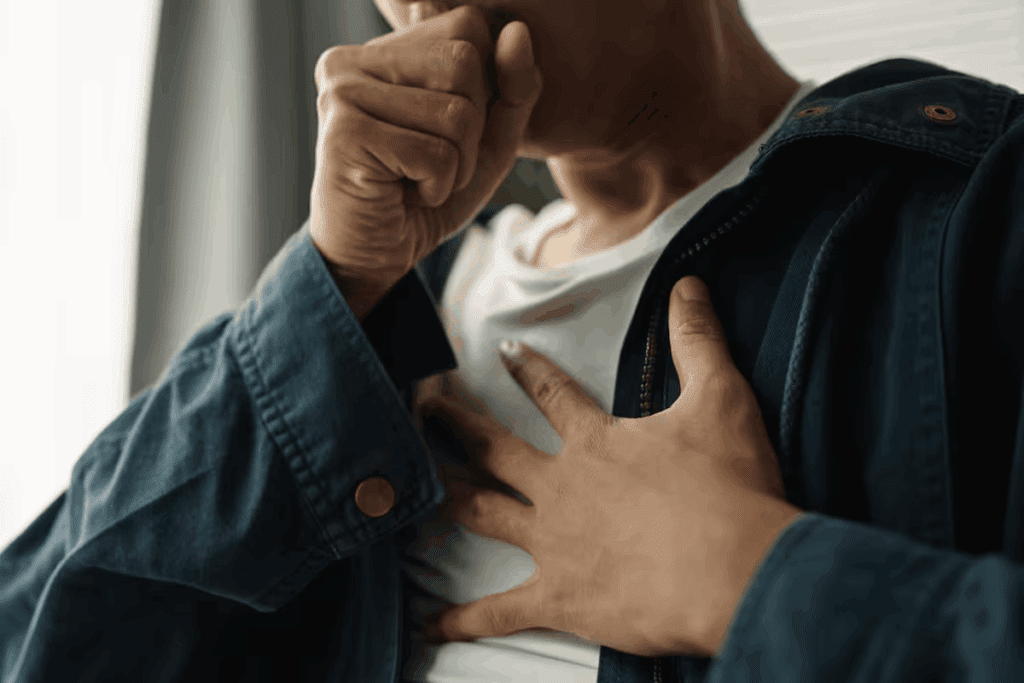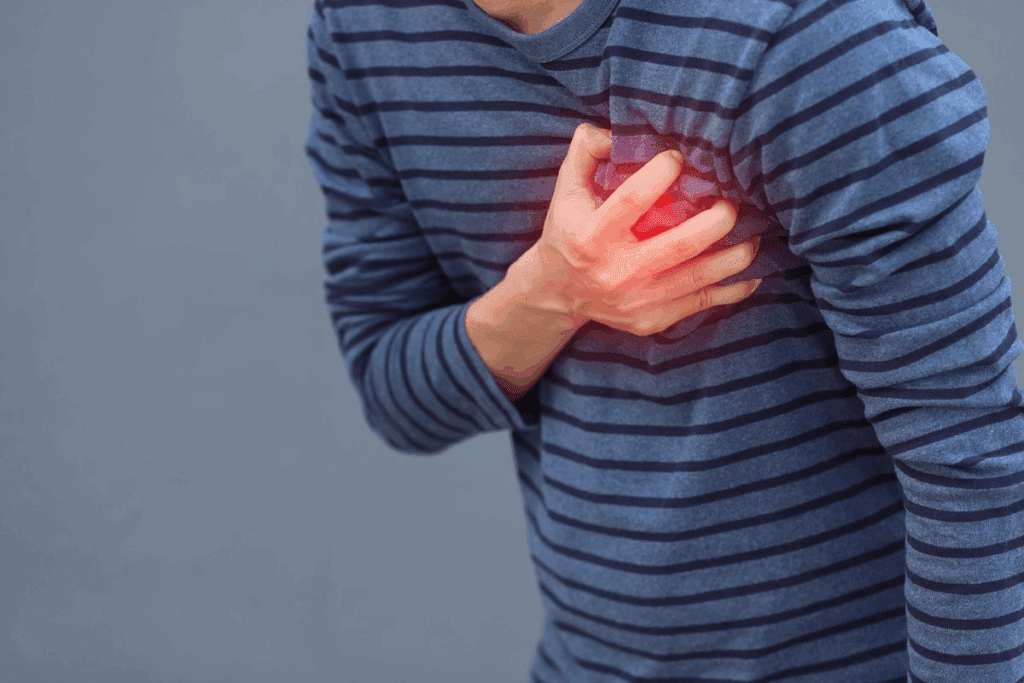Last Updated on October 31, 2025 by Batuhan Temel

Feeling pain in your chest when you drink water or swallow food can be scary. At Liv Hospital, we get how worried this makes you. We’re here to help with all your health needs.
Chest pain from drinking water or swallowing food usually comes from the esophagus. This could be due to esophagitis or motility disorders.
We’ll look into the reasons behind this symptom. It’s key to know what’s causing it and when to see a doctor. Our aim is to offer clear, caring help based on the latest medical standards.
Understand heart pain when swallowing, what causes it, and when to seek medical care.

Chest pain while swallowing or drinking water is a symptom that needs attention. It can feel sharp or dull and might signal an underlying issue. Getting it checked by a doctor is important.
People may feel a sharp, stabbing pain or a dull, squeezing sensation when swallowing. These feelings can come and go or stay the same. They might also have trouble swallowing or feel like food is stuck.
The type of pain can hint at its cause. For example, pain that gets worse with deep breathing or movement might be different from pain only during swallowing.
| Symptom | Possible Indication |
| Sharp pain during swallowing | Esophageal spasm or irritation |
| Dull, squeezing sensation | Potential cardiac issue or esophageal motility disorder |
| Pain accompanied by difficulty swallowing | Possible esophageal stricture or narrowing |
It’s important to tell if chest pain is from the heart or not. Heart pain feels like pressure or tightness and might spread to the arms, back, or jaw. Non-heart pain can come from the esophagus or other chest structures.
To figure it out, look at a few things:
Knowing how swallowing works can help understand chest pain. Swallowing involves the mouth, throat, and esophagus working together. The esophagus is a muscular tube that moves food to the stomach.
When we swallow, the esophagus moves food down in waves. Problems like spasms or inflammation can cause pain.
Understanding these points helps us find the cause of chest pain during swallowing. Then, we can get the right medical help.

Chest pain when swallowing can be scary. It makes people wonder if it’s their heart or esophagus. This pain can come from many sources, so knowing the difference is key.
Telling if pain is from the heart or esophagus can be hard. But, there are important differences. Heart pain feels like tightness in the chest and can spread to the arm, neck, or jaw. It often gets worse with activity or stress.
Esophageal pain, on the other hand, is linked to swallowing. It might feel sharp, burning, or squeezing.
Key differences between cardiac and esophageal pain:
| Characteristics | Cardiac Pain | Esophageal Pain |
| Nature of Pain | Pressure, tightness, or heaviness | Sharp, burning, or squeezing |
| Triggers | Physical activity, stress | Swallowing, certain foods |
| Associated Symptoms | Shortness of breath, dizziness | Difficulty swallowing, regurgitation |
Knowing the signs of heart pain is important. Look out for chest pain that:
Some chest pain situations need immediate help. If you have:
Knowing why you have chest pain is important. If it’s bad or lasts a long time, see a doctor. They can help figure out what’s wrong and what to do next.
GERD is a long-term condition that can cause chest pain, often when drinking liquids like water. It happens when stomach acid flows back into the esophagus. This backwash can irritate the esophagus lining, leading to discomfort.
GERD occurs when the LES doesn’t close right, letting stomach acid into the esophagus. This can cause a burning feeling in the chest, known as heartburn. Drinking water can make this pain worse.
The acid reflux can also cause chest pain that might feel like heart problems. It’s important to know the difference for the right treatment.
Chest pain from GERD feels like burning or squeezing. It can get worse with cold or hot water. Other signs include trouble swallowing, food or sour liquid coming back up, and feeling like there’s a lump in the throat.
To tell if chest pain is from GERD, look for patterns. See if pain happens after eating or drinking. Also, check if it’s with heartburn or food coming back up.
Many things can raise your risk for GERD or make symptoms worse. These include being overweight, pregnant, smoking, and eating certain foods. Foods like citrus fruits, tomatoes, chocolate, spicy dishes, and caffeinated drinks can relax the LES or irritate the esophagus.
Knowing and managing these risk factors and triggers can help control GERD symptoms. This can reduce chest pain when drinking water.
When the muscles in the esophagus don’t work right, it can cause pain. This is because the esophagus can’t move food into the stomach well. This makes drinking water or swallowing very uncomfortable.
Esophageal motility disorders are conditions that affect how food moves through the esophagus. The main types are:
Esophageal spasms can cause sharp pain when drinking water. This is because the abnormal contractions of the esophageal muscles can be triggered by swallowing. The cold liquid can stimulate the esophagus, potentially triggering spasms. The pain can be intense and may be mistaken for cardiac-related chest pain.
Several factors can trigger esophageal spasms, including:
Knowing what triggers these spasms can help manage symptoms. By avoiding triggers and making lifestyle changes, people can lessen their symptoms.
Pain when swallowing or drinking water might mean you have esophagitis. This is an inflammation of the esophagus. It can make swallowing and drinking water painful. This condition can really affect your daily life, making simple things like eating and drinking hard.
Esophagitis comes in several types, each with its own cause and symptoms. The main types are:
The symptoms of esophagitis vary based on the cause but often include:
If not treated, esophagitis can cause serious problems like narrowing of the esophagus (stricture), bleeding, or increased risk of esophageal perforation.
Knowing if esophagitis is caused by an infection or not is key to choosing the right treatment. Infectious esophagitis needs treatment for the underlying infection, often with antifungal or antiviral meds. Non-infectious causes, like GERD or eosinophilic esophagitis, may need treatments to reduce inflammation and manage symptoms.
Here’s a comparison of the different types of esophagitis and their characteristics in the following table:
| Type of Esophagitis | Causes | Common Symptoms |
| Reflux Esophagitis | GERD, stomach acid reflux | Heartburn, chest pain |
| Eosinophilic Esophagitis | Allergic reaction, immune system response | Difficulty swallowing, food impaction |
| Infectious Esophagitis | Fungal, viral, or bacterial infections | Pain when swallowing, fever |
| Drug-Induced Esophagitis | Certain medications | Odynophagia, esophageal ulcers |
Drinking water should be easy and painless. But for some, it can hurt due to esophageal strictures. These strictures are narrow spots in the esophagus. They can be caused by long-term inflammation from GERD or by harmful substances.
Strictures form when the esophagus tries to heal from injury or irritation. Scar tissue builds up, narrowing the esophagus. GERD is a common cause, as stomach acid can cause inflammation and scarring.
Strictures can develop slowly, over months or years. Risks include:
Difficulty swallowing, or dysphagia, is a main symptom of strictures. It feels like food is stuck in the throat or chest pain when drinking water. Symptoms can vary based on how narrow the stricture is.
Some people may feel:
Untreated strictures can cause serious problems. These include severe dysphagia, malnutrition, and a higher risk of aspiration pneumonia. In severe cases, swallowing can become very hard, needing quick medical help.
Proper treatment can prevent these complications. This may include dilation, managing GERD, or surgery.
The mind and body are closely linked. Sometimes, anxiety can show up as physical symptoms like chest pain when drinking water. We’ll look into how our minds can affect our bodies.
The mind and body have a deep connection. Stress and anxiety can cause physical symptoms, like chest pain. This is called somatization, where our mind’s worries turn into physical complaints.
Studies show that people with high anxiety often feel chest pain when they swallow or drink water. It’s not just about swallowing. It’s how our body reacts to stress.
Anxiety triggers our body’s ‘fight or flight’ response. When we’re anxious, our body tightens up. This tension can cause pain or discomfort, including in the chest.
Anxiety can show up in many ways, like:
It’s important to manage stress and anxiety to reduce chest pain. Here are some helpful techniques:
| Technique | Description | Benefits |
| Deep Breathing Exercises | Slow, deliberate breathing to calm the nervous system | Reduces anxiety, slows heart rate |
| Progressive Muscle Relaxation | Tensing and relaxing different muscle groups | Reduces physical tension, promotes relaxation |
| Mindfulness Meditation | Focusing on the present moment to reduce stress | Decreases anxiety, improves mental clarity |
By understanding the role of anxiety in chest pain and using these techniques, we can manage our symptoms. This improves our overall well-being.
Figuring out why you feel chest pain when drinking water or swallowing is a detailed process. It’s scary to feel this way, so we take a careful approach to find out what’s causing it.
Our first step is to talk about your symptoms and medical history. We want to know when and how your chest pain happens. We also ask about what makes it better or worse. This helps us start to figure out what might be wrong.
To find out why you’re feeling chest pain, we might use different tests. These include:
These tests help us spot problems like esophagitis, strictures, or motility disorders.
It’s very important to make sure you don’t have a serious problem causing your chest pain. We’re worried about heart issues because they can be very dangerous. We also check for other serious problems like esophageal rupture or infections.
| Diagnostic Test | Purpose |
| Endoscopy | Visual examination of the esophagus |
| Barium Swallow | X-ray visualization of the esophagus |
| Manometry | Assessment of esophageal muscle contractions |
| pH Monitoring | Measurement of esophageal acid levels |
We use the results of these tests, along with your medical history and initial assessment, to find out what’s causing your pain. Then, we can create a treatment plan just for you.
Managing chest pain from drinking water needs a full plan. This plan includes lifestyle changes, medicines, and sometimes surgery.
Changing your lifestyle is key to handling chest pain from drinking water. Adjusting eating habits can really help. Eat smaller meals often to ease pressure on your esophagus. Also, avoid foods that might irritate or cause allergic reactions.
Keeping a healthy weight is also important. Being overweight can make stomach pressure worse, leading to pain. Try elevating the head of your bed by 6-8 inches to stop stomach acid from flowing back into your esophagus at night.
The right medicine depends on why you’re feeling chest pain. For GERD, antacids and acid reducers can quickly ease symptoms by balancing stomach acid. For esophageal spasms, calcium channel blockers or nitrates can relax the muscles.
If an infection or inflammation is causing pain, antibiotics or antiviral medications might be needed. Sometimes, corticosteroids are used to reduce swelling. We’ll talk more about these options based on your diagnosis.
For some, more serious treatments are needed. For esophageal strictures, dilation can widen the esophagus. For achalasia, botulinum toxin injections or pneumatic dilation can relax muscles.
In severe GERD cases, fundoplication surgery might be an option. This involves wrapping the stomach around the esophagus to stop acid reflux.
There are also self-care steps to help with chest pain from drinking water. Stress management is key, as stress can make symptoms worse. Try meditation, deep breathing exercises, or yoga to help.
Avoiding irritants like hot or cold drinks, spicy foods, and citrus fruits can also help. Drinking water regularly, not all at once, can also ease discomfort.
Knowing why your chest hurts when you drink water is key to managing it well. We’ve looked at many reasons for this pain, like GERD, esophageal spasms, and esophagitis.
If your chest pain is constant or very bad, you should see a doctor. At Liv Hospital, we offer top-notch care for international patients. We make sure you get the help you need.
Being aware of the causes and taking steps to prevent them can help. If you’re feeling pain, talk to a doctor. They can find out why and how to fix it.
Chest pain from drinking water or swallowing food can have many causes. These include GERD, esophageal spasms, and esophagitis. We explore these conditions to help you understand and seek medical help if needed.
Cardiac chest pain is linked to heart issues, like heart attacks. It often feels like a heavy weight in the chest and can spread to the arm or jaw. Non-cardiac pain, on the other hand, is usually related to the esophagus or other non-heart problems. If you’re not sure, it’s best to see a doctor.
Heart-related chest pain is serious. Look out for severe, crushing pain, pain that spreads to the arm or jaw, shortness of breath, and dizziness. If you have these symptoms, get emergency help right away.
GERD is when stomach acid flows back into the esophagus. This irritation can cause discomfort, including chest pain, when you drink water or eat.
Esophageal spasms are abnormal muscle contractions in the esophagus. They can cause sharp, severe pain when drinking water or eating. Stress and certain foods can trigger these spasms.
Esophagitis is inflammation of the esophagus. It can cause pain when swallowing, trouble swallowing, and chest pain. It’s caused by infection, acid reflux, or allergic reactions.
Esophageal strictures are narrowings of the esophagus. They can cause trouble swallowing and chest pain. Doctors use endoscopy or imaging tests to diagnose them. Treatment may include dilation or other interventions.
Yes, anxiety and stress can cause physical symptoms, including chest pain. Techniques like relaxation, deep breathing, and stress management can help ease this discomfort.
Tests for chest pain include endoscopy, imaging like X-rays or CT scans, and other procedures. These help rule out serious conditions.
Treatment for chest pain depends on the cause. It may include lifestyle changes, medication, procedures, and surgery. Self-care techniques are also important.
Seek medical help for severe, persistent, or concerning chest pain. It’s always safer to be cautious with your health.
Drinking water can cause sharp chest pain due to conditions like esophageal spasms or esophagitis. If this happens often, see a healthcare professional for an evaluation.
Yes, drinking water can worsen symptoms of pre-existing esophageal conditions like GERD or esophageal strictures. This can lead to chest pain.
National Center for Biotechnology Information. (2025). Why Does My Chest Hurt When I Drink. Retrieved from https://www.ncbi.nlm.nih.gov/books/NBK559174/
Subscribe to our e-newsletter to stay informed about the latest innovations in the world of health and exclusive offers!
WhatsApp us